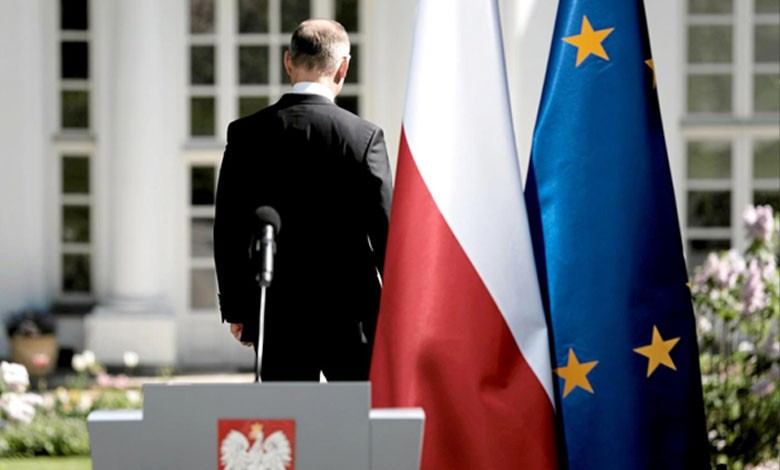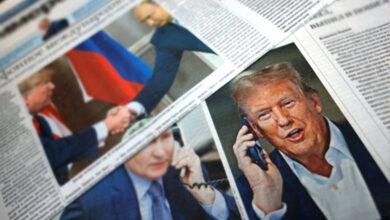Polish EU Presidency: Security and Support for Ukraine Are Priorities

Poland is recovering from the shock of the results of the American elections and is preparing for the presidency of the Council of the EU. Currently, the country is entering the finish line in preparation for this important mission, clearly emphasizing the historicity of its mission and reminding that its leadership in the EU coincided with the beginning of the new term of the presidency of Donald Trump. So with the USA, no matter what, it is necessary to establish friendly and strong relations.
Deputy Minister of EU Affairs Magdalena Sobkoviak the other day reported, that the budget has already been approved and a calendar of almost 500 events planned for this period has been drawn up. Next week, Poland hosts the first preparatory visit of the Secretary General of the European Commission. The visit involves the discussion of key topics and issues that will determine the agenda of the Polish presidency of the EU Council.
Safety above all else
The main topic of Poland’s future presidency in the EU will be security, which will be considered through seven key aspects. The first of them is external and military security. This area includes the “Tarcza Wschód” initiative, which Poland considers an important element of the protection of the EU’s eastern borders. As Deputy Minister for EU Affairs Magdalena Sobkowiak noted, although Poland bears the main burden of creating this protective shield, the responsibility must be shared. Poland expects greater involvement and support from its partners, because it is not only the Polish border, but also the external border of the entire European Union.
The second important direction is the development of the defense industry within the EU. It envisages increasing the level of self-sufficiency and technological independence in the production of weapons and defense equipment, as well as strengthening the defense potential for effective response to modern threats.
Energy security and economic stability will be important vectors of the Polish presidency in the EU. Poland aims to continue the process of energy independence from internal and external sources, promoting stability of supply and diversification of resources. This goal is particularly important in the context of modern energy challenges in Europe, when the issue of reducing dependence on traditional suppliers becomes a priority.
In the field of economic security, the discussion of the new EU budget will be a key topic. In this connection, Magdalena Sobkowiak explained that Poland questions the expediency of centralizing financial instruments in Brussels and advocates the expansion of powers for the regions. The Polish position remains unchanged: the country wants the regions to have more freedom in making economic decisions. And this involves abandoning the practice of establishing “control benchmarks” and returning to decision-making at the national level, taking into account the needs of the regions. This approach of Poland is aimed at increasing the role of local authorities in determining strategic directions of development and giving them greater independence in financial management to increase regional economic stability and efficiency.
Poland would also like the first chapters of EU accession to be opened by Ukraine during its presidency.
It is noteworthy that Poland constantly appeals to its previous EU presidency to emphasize its experience and achievements in this role, as well as to confirm its consistency and commitment to key issues of security and regional autonomy within the European Union. For the first time, Poland presided over the EU in the second half of 2011, when it paid special attention to issues of energy security, strengthening the integration of Eastern Europe into the EU structures, as well as the involvement of the “Eastern Partnership” countries. The Polish leadership then initiated projects aimed at strengthening the stability of the EU energy sector and diversifying energy sources, which remains an important priority today.
History is now being made in Ukraine
Today, the Minister of Foreign Affairs, Radoslav Sikorsky, met with the leader of European diplomacy, Josep Borrell, who has just returned from Ukraine. At the joint press conference, among other things, they did several things statement, concerning Ukraine. In particular, Sikorsky, appealing to the future presidency of the EU, emphasized that the European Union has responsibility for its citizens, its neighbors and future generations. He emphasized the importance of the taboo on changing borders in Europe by force. Sikorskyi said that “history is now being made in Ukraine, in our region” and added that at the next meeting of the Foreign Affairs Council, key issues will be discussed, which will depend on the extent to which the EU can demonstrate its unity, strength and ability to act strategically. This primarily concerns the support of Ukraine, as well as the determination of a unified strategy against Russian aggression, since its future reliability and influence depend on the actions of the EU in the international arena.
Poland is preparing to become the leader of Europe
Poland is gradually adapting to the results of the American elections and is building its line of interaction with the United States within the framework of NATO and further support for Ukraine. Among politicians, there are voices about the need to cooperate with the United States, regardless of who enters the Oval Office.
“Everyone, without exception, must take more responsibility for maintaining a strong transatlantic relationship, regardless of how they felt about the election results.“, – stated Donald Tusk, preparing for meetings with French leader Emmanuel Macron and NATO Secretary General Mark Rutte. The Polish prime minister is trying to master Poland’s new role in the EU, which is connected with the rotation of the presidency. His plans also include visits to British Prime Minister Keir Starmer and the leaders of Northern Europe and the Baltic states.
Tusk is convinced: “Without a doubt, the new political landscape is a serious challenge for everyone, especially if we consider the possibility of an end to the Russian-Ukrainian war as a result of an agreement, say, between the president of Russia and the new leader of the United States.”.
Poland strengthens the defense budget
One of the emphasis of Trump’s pre-election rhetoric was skepticism about NATO, which the potential US leader did not want to spend money on at the time, telling the Europeans that they should take care of their own security, in particular, express it in monetary terms.
This year, Poland spent 4% of GDP on defense. Next year, this indicator is planned to increase to 4.7%. The mayor of Warsaw, Rafal Tszaskowski, who intends to take part in the presidential elections next year, believes that these figures give Poland a reason to be a model for other countries in the EU and NATO. Moreover, he is convinced that Poland, as the 21st economy in the world, has the right to apply for G20 membership in the near future. His campaign rhetoric is full of criticism of Prime Minister Tusk and his government, who should have resigned after Trump won the election.
In turn, the President of Poland Andrzej Duda is preparing to meet with the newly elected President of the United States Donald Trump even before he goes through the inauguration procedure. During a visit to Azerbaijan, Duda was caught in a storm questions journalists from Baku, who were interested in whether he could influence Trump so that he would not give part of Ukraine to Putin. Duda assured that the topic of Ukraine will be the first topic during his meeting with Trump in January of next year, because Poland will begin its presidency of the EU Council on January 1.
Trump is not the only one
“Harris or Trump?” — wrote Donald Tusk on the X Network, commenting on the tense US election race. His words reflected concern about how the outcome of this election could affect the future of Europe. At the same time, Tusk warned: “Some say that the future of Europe depends on the American elections, and it depends primarily on us“.
Europe must understand that the time when its security and prosperity depended on external actors is over. In the context of the constantly changing international situation and new geopolitical challenges, Europe needs to rely more on its own forces. Tusk emphasizes that “provided that Europe finally grows up and believes in its own strength“, it will be able to cope with any external and internal threats. Europeans must realize that they can no longer rely on others to ensure peace and stability on the continent.
Indeed, the time of geopolitical outsourcing is passing.





